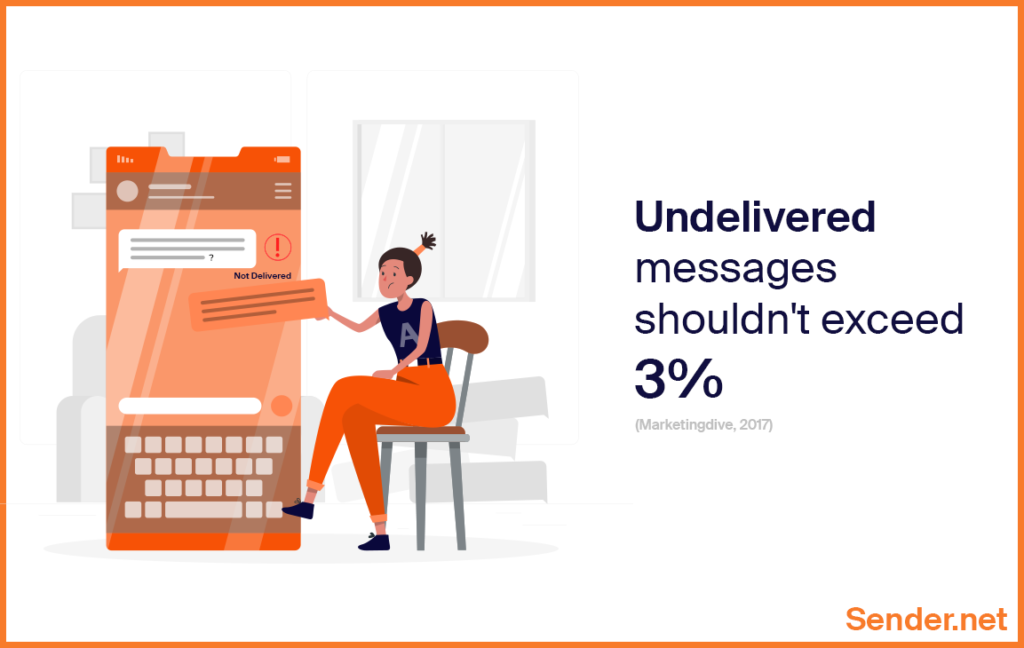Every good marketing campaign and strategy begins with sorting out goals and ways to measure them.
While there are numerous systems to track business, marketing, and other process performance, key performance indicators (KPIs) remain one of the most common metrics.
Lots of data can serve as KPIs for marketing campaigns. However, instead of looking for the best fit through trial and error, using knowledge acquired from other businesses is usually the saner approach.
Thus, we decided to outline the best SMS KPIs and goals for companies to follow. Additionally, we have provided ways to calculate these KPIs differently.
SMS KPIs: Delivery Rate
Delivery rate can serve several purposes at once. Of course, the most obvious purpose is to have a solid foundation for all other metrics. After all, if messages aren’t being delivered, everything else doesn’t matter as much.
However, as a SMS KPI delivery rate can serve as a benchmark for the customer database. While people don’t change phone numbers or block marketing communication channels that frequently, delivery rates will still allow you to see the amount of real contacts in your list. Thus, this metric can become a measuring stick that shows whether you should be revising your list.
As a benchmark, if there are undeliverable over 3 percent, there is likely something wrong. Of course, it could be a temporary carrier issue that will resolve itself automatically. However, if the undeliverables stay over 3 percent for an extended period of time, there is something definitely wrong.

It’s important to note that if messages are not being delivered routinely, that may not be the carrier’s fault. There are a lot of legal intricacies involved with sending SMS messages that carriers have to follow. It’s entirely possible that opting-in is set up erroneously, causing undelivered messages. In these cases, it’s recommended to give a legal professional a look.
Finally, if there are some dead numbers or the need to clean up the subscriber database arises, using tools for number validation or HLR lookup might be the more efficient way. There are numerous services and solutions that will allow you to automate the clean up process.
SMS KPIs: Opt-Out Rate
SMS opt-outs are significantly more accurate metrics than email unsubscribes. In email marketing, unsubscribes do not truly reflect the rate at which recipients churn. Many people simply archive or stop opening emails.
With SMS, most people either opt-out or continue reading and opening text messages. Very few people simply ignore them. In fact, some marketers cite a higher unsubscribe rate in SMS when compared to email. However, that is likely due to the behavior noted above.
Therefore, if your opt-out rate is higher with SMS over email, that’s not necessarily a cause for concern. However, this SMS KPI can give you insight into how effective (or how annoying) your marketing campaigns are.
Remember that just like with email marketing, recipients should be provided a way to unsubscribe from your messages. Doing otherwise might cause a number of issues. It’s highly recommended to send a personalized unsubscribe link or keyword at the end of the initial welcome message.
Finally, opt-out rates are usually measured by dividing the amount of opted-out subscribers by the total number of subscribers. For more granular data, it’s recommended to calculate monthly opt-in rates and match them with opt-out rates.
These metrics should be done over a specific timescale (e.g. a month). Having access to statistical deltas (e.g. monthly differences in rates) may provide additional insight into the effectiveness of SMS marketing campaigns.
SMS KPIs: Conversion Rate
Conversion rate is the king of all key performance indicators. All other metrics can be sky high but if the conversion rate is lacking – the marketing efforts are failing.
However, click-through rate should be benchmarked as well. While conversion rate is the performance indicator, click-through rate will reveal the location of a potential bottleneck. If SMS CTR is low, that means there’s some issue within the marketing process. High CTR and low conversions will likely mean bad UX, pricing models, etc.
Therefore, conversion rate should be looked at in the context of other metrics. Especially, if something is going wrong. Singling out conversion rate might cause marketers to make bad conclusions (e.g. website needs to be changed but the culprit is bad targeting), causing even more issues down the road.
There are several ways to track conversion rates effectively. One of the first options is to simply measure traffic and buying intensity on days when the SMS messages are sent. If the marketing is effective at all, there will be traffic and buying irregularities. These irregularities can be assigned to SMS messages.
Of course, there are some ways that are much easier to automate, and that has to do with UTM tags. The easiest way to get the tags going is to use the Google Tag Manager tool as it’s pretty self-explanatory. Additionally, Google offers URL shortening once the process is complete – something that is immensely useful in SMS where characters are limited.
Finally, there’s one other way to track conversions that’s almost foolproof. However, it works only for ecommerce and other stores. Each SMS campaign can have an associated discount code. Since probably no one will pass up a discount, no matter how small, the data will be incredibly accurate. Although, there is a possibility that discount codes were shared, which would slightly muddle the data.
Have clear goals and focus on KPIs
While SMS KPIs can be made out of any metric, even such things as open rates, we have outlined the three most important ones above. Tracking naturally high metrics like open and read rates is not necessary as the data will provide no insight. There’s simply not much room for improvement if the rates are close to 99% naturally.
However, tracking the three KPIs outlined above can bring immense insight into the efficiency of marketing efforts. In fact, these three should be more than enough for most businesses as with some ingenuity they can cover nearly all possible issues and reveal possibilities for improvement.
Want to find out more about SMS and email marketing? Check out the Sender.net blog for more information. We have covered SMS statistics, benchmarks, templates, and many other things that will help you optimize your marketing efforts!
Also read:


